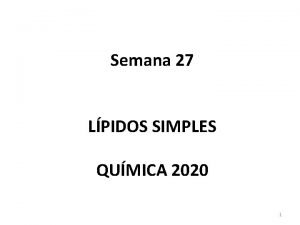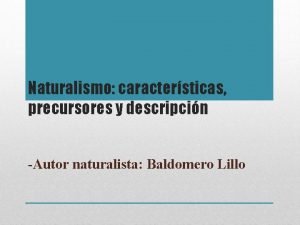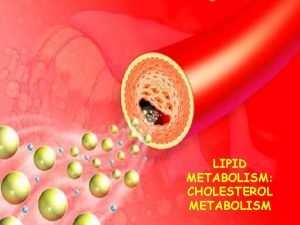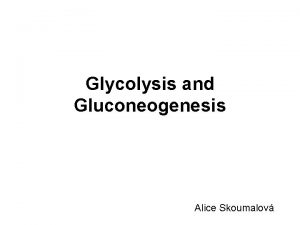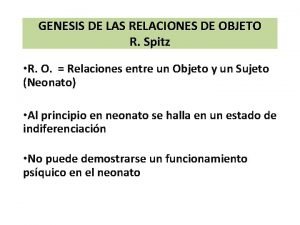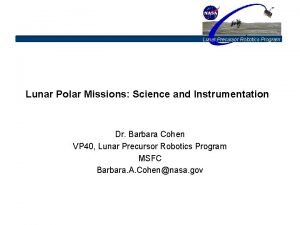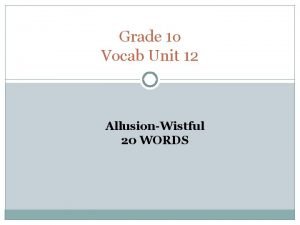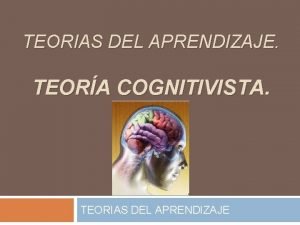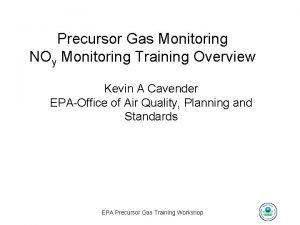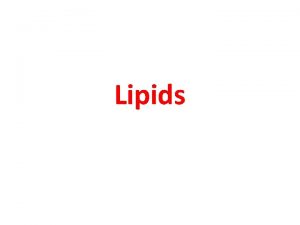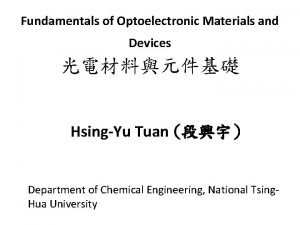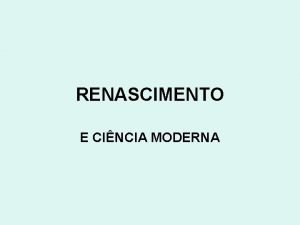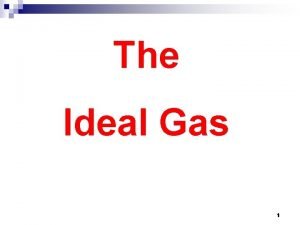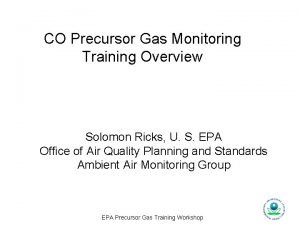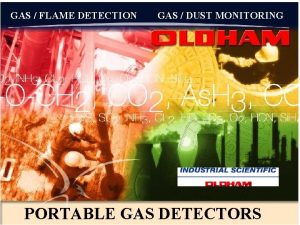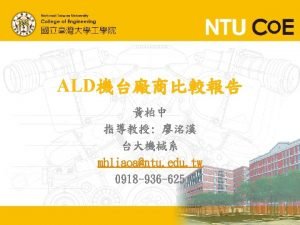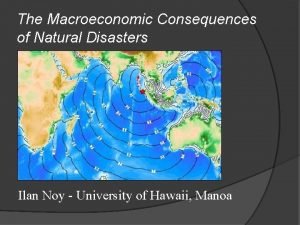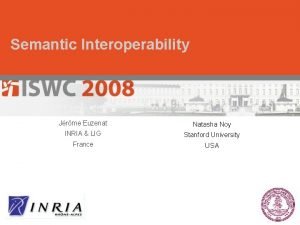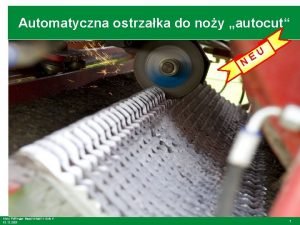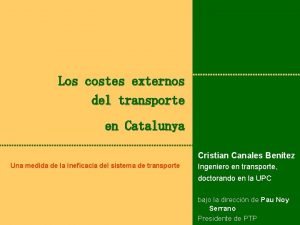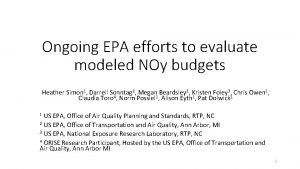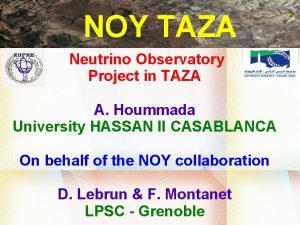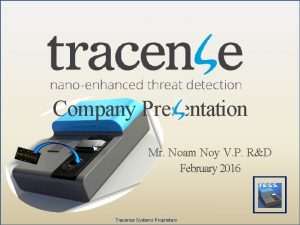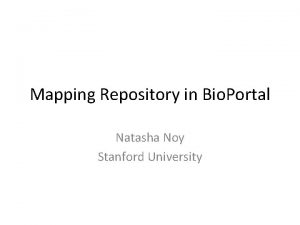Precursor Gas Monitoring NOy Monitoring Training Overview Kevin



















- Slides: 19

Precursor Gas Monitoring NOy Monitoring Training Overview Kevin A Cavender EPA-Office of Air Quality, Planning and Standards EPA Precursor Gas Training Workshop

Outline • • • Methodology Interferences and operational issues Commercially available NOy Monitors Calibration Current work in progress Summary EPA Precursor Gas Training Workshop

Methodology What is NOy? NOy consists of the sum of all reactive nitrogen oxides. including NO, and NO 2, and other nitrogen oxides referred to as NOz. NO + NO 2 + NOz = NOy The major components of NOz include nitrous acids [nitric acid (HNO 3), and nitrous acid (HONO)], organic nitrates [peroxyl acetyl nitrate (PAN), methyl peroxyl acetyl nitrate (MPAN), and peroxyl propionyl nitrate, (PPN)], and particulate nitrates. EPA Precursor Gas Training Workshop

Methodology Why Measure NOy? • NOy is a precursor to both ozone and PM 2. 5 formation • Conventional NOx boxes “accidentally” measure some NOz species, but not all. EPA Precursor Gas Training Workshop

Methodology Measurement Principles NO is measured based on its chemiluminescent reaction with O 3 NO + 03 -> NO 2 + hv The amount of light generated is linearly proportional to the concentration of NO. NOy is measured by first passing the sample through a converter that converts NO 2 and NOz species to NO and then measuring for NO as above. EPA Precursor Gas Training Workshop

Methodology Diagram of a High Sensitivity NOy instrument EPA Precursor Gas Training Workshop

Methodology What makes a high sensitivity NOy monitor different than a conventional (low sensitivity) NOx monitor? A high sensitivity NOy monitor is very similar to conventional NOx monitors with the following exceptions: • Remote converter is located at sample inlet, not inside monitor • Pre-reactor to reduce non-NOy interferences • Increased sample flow rate • Reduced reaction chamber temperature and pressure EPA Precursor Gas Training Workshop

Installation Remote Converter on 10 meter tower EPA Precursor Gas Training Workshop

Interferences and Operational Issues • Reaction of NO with ambient O 3 • Ambient ozone will react with NO in sample lines creating negative NO interference • Residence in sample line should be kept to less than 2 seconds • Ammonia • Converter may convert a small amount of ammonia to NO creating positive NO interference • Avoid locating near ammonia sources (e. g. , feed lots) • Converter height above ground level and “fetch” EPA Precursor Gas Training Workshop

Commercially Available NOy Monitors TAPI 200 EU/501 NOy TEI 42 CY EC 9841 A-NOy EPA Precursor Gas Training Workshop

Testing Results Make/Model Thermo 42 CY NOy (observed) API 200 EU/501 (observed) 120 seconds 0 -100 ppb Zero Drift (0. 1 ppb/day) 12 hr. (0. 1 ppb) 24 hr. (0. 1 ppb) 12 hr. (0. 03 ppb) 24 hr. (0. 05 ppb) Span Drift 20% FS (0. 3%) 80% FS (0. 6%) 20% FS (0. 5%) 80% FS (1. 2%) 1. 49% 2. 67% Bias +/-1. 19% +/-2. 73% LDL (0. 05 ppb) 0. 05 ppb Noise (0. 025 ppb) 0. 013 ppb 0. 009 ppb 1. 0003 x-0. 0753 R 2 = 0. 9999 1. 0088 x-0. 0418 R 2 = 0. 9999 0. 050 ppb (0. 03 – 0. 13 ppb CL) 0. 058 ppb (0. 04 – 0. 11 ppb CL) Averaging Time Conc. Range Precision (Coefficient of Variance) Linearity (1% FS. M, B, and R 2 reported) MDL Observed EPA Precursor Gas Training Workshop

NOy Span Response EPA Precursor Gas Training Workshop

NOy Precision Response EPA Precursor Gas Training Workshop

Histogram of NOy Data Collected at Burden's Creek Site 5/1/05 -1/29/06 NO NOy Percent NO 2 + NOz 0 0 -1 1 -5 5 -10 10 -50 50 -100 Concentration (ppb) EPA Precursor Gas Training Workshop 100 -200 200+

Histogram of NOy Data Collected at Burden's Creek Site 5/1/05 -1/29/06 Bin 0 NO NOy NO 2+NOz 728 8 140 0 -1 1958 53 50 1 -5 962 1283 1452 5 -10 240 1380 1499 10 -50 452 1489 50 -100 196 275 0 100 -200 92 146 0 200+ 2 3 0 Total 4630 EPA Precursor Gas Training Workshop

Instrument Operation Initial Calibration • • • Note: Supply sufficient calibration gas to ensure excess flow through converter inlet (supply > 5 liters per minute) Supply zero air until stable readings are obtained (approximately 20 -30 minutes) Adjust monitor to read zero response for NO and NOy. Supply NO calibration gas at approximately 90% of scale Adjust monitor after stable NO and NOy readings are obtained Add ozone to calibration gas to produce NO 2 at approximately 70% of scale Amount NO decreases equals the amount of NO 2 created Calculate conversion efficiency as (NOy-NO)/(NO 2 created) Conversion efficiency should be greater > 96%. Adjust NO 2 + NOz reading to amount of NO 2 created EPA Precursor Gas Training Workshop

Instrument Operation Converter Efficiency Test • Converter efficiency test designed to challenge converter with more difficult to convert NOy species • N-propyl nitrate, isopropyl nitrate • Supply sufficient calibration gas to ensure excess flow at converter inlet (> 5 liters per minute) • Supply calibration gas at approximately 90% of scale • Allow sufficient time for readings to stabilize • Calculate converter efficiency as – (NOy reading/Concentration Suppliedx 100%) • If converter efficiency is less than 96% the converter should be repaired/replaced EPA Precursor Gas Training Workshop

Current Work In Progress • Evaluation of inlet materials for API – Testing HNO 3 loss on stainless steel, silico steel, and FTP teflon. • Evaluation of “proof of concept” NO/true NO 2/NOy monitor – Two converters • Moly for NOy • High intensity LED for NO 2 EPA Precursor Gas Training Workshop

Questions? EPA Precursor Gas Training Workshop
 Nietzsche como precursor de la posmodernidad
Nietzsche como precursor de la posmodernidad Triglicérido
Triglicérido Autor de la imagen
Autor de la imagen Function of cholesterol
Function of cholesterol Precursor of gluconeogenesis
Precursor of gluconeogenesis Anobjetal
Anobjetal Trickster archetypes
Trickster archetypes Lunar precursor robotic program
Lunar precursor robotic program Wistful in a sentence
Wistful in a sentence Carl jung trickster
Carl jung trickster Cognoscitivismo
Cognoscitivismo Precursor
Precursor 2 functions of lipid
2 functions of lipid Hsing-yu tuan
Hsing-yu tuan Adult stem cells
Adult stem cells Precursor do renascimento
Precursor do renascimento Ba(me5cp)2
Ba(me5cp)2 Precursor
Precursor Chaturanga precursor
Chaturanga precursor Ideal gas vs perfect gas
Ideal gas vs perfect gas

